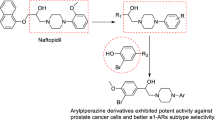Abstract
Androgen receptor (AR) signaling is often activated in prostate cancer (PCa) cells, and blockage of this signaling by AR antagonists is an important strategy in PCa therapy. In this study, we designed and synthesized a series of 2-(5-methyl-1H-pyrazol-1-yl) acetamide derivatives, and evaluated their biological activities. AR luciferase reporter assay revealed compound 6f (59.7%) as a potent AR antagonist. Some compounds in this series showed higher anti-proliferative activity against LNCaP cells than Bicalutamide (IC50 = 35.0 μM), especially 6g with IC50 value of 13.6 μM.




Similar content being viewed by others
References
De Bono JS, Logothetis CJ, Molina A, Fizazi K, North S, Chu L, Chi KN, Jones RJ, Goodman Jr. OB, Saad F et al (2011) Abiraterone and increased survival in metastatic prostate cancer. N Engl J Med 364:1995–2005
Guo G, Liu J, Wang G, Zhang D, Lu J, Zhao G (2016) Synthesis and biological evaluation of 3-(4-fluorophenyl)-1H-pyrazole derivatives as androgen receptor antagonists. Anticancer Drug 27:278–285
Harris WP, Mostaghel EA, Nelson PS, Montgomery B (2009) Androgen deprivation therapy: progress in understanding mechanisms of resistance and optimizing androgen depletion. Nat Clin Pract Urol 6:76–85
Katzenwadel A, Wolf P (2015) Androgen deprivation of prostate cancer: leading to a therapeutic dead end. Cancer Lett 367:12–17
Locke JA, Guns ES, Lubik AA, Adomat HH, Hendy SC, Wood CA, Ettinger SL, Gleave ME, Nelson CC (2008) Androgen levels increase by intratumoral de novo steroidogenesis during progression of castration-resistant prostate cancer. Cancer Res 68(15):6407–6415
Mercader M (2007) Early effects of pharmacological androgen deprivation in human prostate cancer. BJU Int 99:60–67
Montgomery RB (2008) Maintenance of intratumoral androgens in metastatic prostate cancer: a mechanism for castration-resistant tumor growth. Cancer Res 68:4447–4454
Mostaghel EA (2007) Intraprostatic androgens and androgen-regulated gene expression persist after testosterone suppression: therapeutic implications for castration-resistant prostate cancer. Cancer Res 67:5033–5041
Oudard S (2013) Progress in emerging therapies for advanced prostate cancer. Cancer Treat Rev 39:275–289
Reid AHM (2008) CYP17 inhibition as a hormonal strategy for prostate cancer. Nat Clin Pract Urol 5:610–620
Taplin ME (2007) Drug Insight: role of the androgen receptor in the development and progression of prostate cancer. Nat Clin Pract Oncol 4:236–244
Tran C, Ouk S, Clegg NJ, Chen Y, Watson PA, Arora V, Wongvipat J, Smith-Jones PM, Yoo D, Kwon A, Wasielewska T, Welsbie D, Chen CD, Higano CS, Beer TM, Hung DT, Scher HI, Jung ME, Sawyers CL (2009) Development of a second-generation antiandrogen for treatment of advanced prostate. Cancer Sci 324(5928):787–790
Acknowledgements
This work was financially supported by the National Natural Science Foundation of China (No. 21272140), Key Research and Development Project of Shandong Province (No. 2017CXGC1401), and the Knowledge Foundation (No. 201550084) of Sweden.
Author information
Authors and Affiliations
Corresponding author
Ethics declarations
Conflict of interest
The authors declare that they have no conflict of interest.
Additional information
Publisher’s note: Springer Nature remains neutral with regard to jurisdictional claims in published maps and institutional affiliations.
Supplementary Information
Rights and permissions
About this article
Cite this article
Dong, J., Zhang, J., Li, Z. et al. Design, synthesis, and biological evaluation of 2-(5-methyl-1H-pyrazol-1-yl) acetamide derivatives as androgen receptor antagonists. Med Chem Res 28, 380–386 (2019). https://doi.org/10.1007/s00044-019-02291-y
Received:
Accepted:
Published:
Issue Date:
DOI: https://doi.org/10.1007/s00044-019-02291-y




